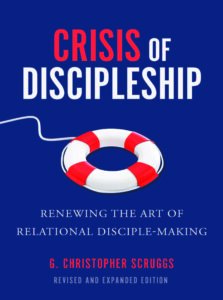This week, I wanted to return to discipleship and our calling to follow Jesus. The gospels are full of Jesus, calling people in the Gospel of Mark, which the Sunday school class is currently studying, Jesus begins his ministry along the Sea of Galilee, where he sees four fishermen at work:
Passing alongside the Sea of Galilee, he saw Simon and Andrew, Simon’s brother, casting a net into the sea, for they were fishermen. And Jesus said to them, “Follow me, and I will make you become fishers of men.” And immediately, they left their nets and followed him. Going a little farther, he saw James, the son of Zebedee, and John, his brother, who were in their boat mending the nets. Immediately, they left their father Zebedee in the boat with the hired servants and followed him(Mark 3:16-20).
In Mark 2, Jesus continues his calling of disciples, now in the home of Matthew, a sinner and tax collector. Here is how Mark records the incident:
He went out again beside the sea, and all the crowd was coming to him, and he was teaching them. And as he passed by, he saw Levi, the son of Alphaeus, sitting at the tax booth, and he said to him, “Follow me.” And he rose and followed him. And as he reclined at a table in his house, many tax collectors and sinners were reclining with Jesus and his disciples, for many followed him. And the scribes of the Pharisees, when they saw that he was eating with sinners and tax collectors, said to his disciples, “Why does he eat with tax collectors and sinners?” And when Jesus heard it, he said to them, “Those who are well do not need a physician, but those who are sick. I came not to call the righteous, but sinners” (Mark 2:13-17).
Deciding to Follow Jesus
 We sometimes think it was easier for the first disciples to follow Jesus. We think that, if we physically saw Jesus, if he came and personally asked us to follow him, we would find it easier to follow than after hearing a pastor, evangelist, or friend share what God has done in their lives and ask us if we are ready to follow Jesus. [1] This is a mistake. People today have to make the same decision the first disciples made. We must decide to follow Jesus without knowing exactly who he is or where he will lead us.
We sometimes think it was easier for the first disciples to follow Jesus. We think that, if we physically saw Jesus, if he came and personally asked us to follow him, we would find it easier to follow than after hearing a pastor, evangelist, or friend share what God has done in their lives and ask us if we are ready to follow Jesus. [1] This is a mistake. People today have to make the same decision the first disciples made. We must decide to follow Jesus without knowing exactly who he is or where he will lead us.
The first disciples had it just as hard as we do. They had families. They had friendships. They had occupations. They already had a religion. They went to the Temple periodically and attended festivals. They probably went to the little synagogue in Capernaum. They had homes and responsibilities. They did not have the gospels or the records of Jesus’ life, death, and resurrection we can read and study. They actually had much less information than we have.
One day, a man came up to them and asked them to follow him and become fishers of human beings. At that moment, they had to decide whether to follow or not. The gospels tell us that the disciples heard the invitation, left what they were doing, and followed (Matthew 4:20; Mark 1: 18, 20; Luke 5:11). Somehow, amidst the hustle and bustle of earning a living, caring for spouses, parents, and children, and being engaged in family and civic affairs, the disciples saw something important in Jesus and decided it was worth the risk of following him into the unknown. They did not have it easier than we do. In fact, they had it harder. We can look back at the generations of lives changed, of people healed, of ministries and missions of compassion and care. They had to decide without any of this history. They were the first followers.
We, on the other hand, have examples of people like St. Francis of Assisi, Dietrich Bonhoeffer, Mother Teresa, and hosts of others. We have many reasons to know what God can do with one ordinary life. When Jesus called the disciples, the cross, resurrection, and spreading of the gospel, the church’s birth, the example of the martyrs, the evangelization of the world had not occurred. It was all to come. They had to look into an unknown traveling rabbi’s eyes and answer, “Will I follow him or not?”
We are called to answer the same question: “Am I going to follow Jesus?” As we ponder that question, we ask ourselves the same questions the disciples must have asked: “Am I willing to follow Jesus and to trust him in all my daily life?” “Am I willing to give up everything to be a follower of Jesus?” “Am I willing to spend time with this teacher and his rabble band of followers?” “Am I willing to risk the life I know so well for a life of uncertainty?”
Contemporary Discipleship
When Christians affirm that God is personal, and when we proclaim that in the person of Jesus of Nazareth, the word of God was present personally with the human race, we indicate that any relationship with God is personal in nature. This means that the personal calling of the Twelve is no different than our individual calling. Christ is present in the world by the power of the Holy Spirit and still calls people to follow him. It’s a personal calling by a person to a person to become part of the church of Jesus Christ, which in other places is called the family of God or the kingdom of God.
The certainty we have or do not have about our calling is personal. It’s not a mathematical certainty. It’s not a scientific certainty, a kind of law of the universe. It’s a personal call by a personal God to people. The reason I’ve called this the unbelievable calling is because it is unbelievable. I suspect the apostles felt the same way. Let’s just take Matthew as an example. I suppose he would’ve considered himself one of the last people that the Messiah Israel would call to be a disciple and eventually an apostle or one sent to proclaim the word of God to others. He was a sinner. He was a social outcast. He was a person despised by his local community. Nevertheless, Jesus called him.
Peter might easily have felt the same way. Peter deserted Jesus and denied him. He took himself out of a personal relationship with Jesus when Jesus needed him the most. Yet, after the resurrection, Jesus tells the women to “Go tell the disciples and Peter,” who has made himself no longer a part of the disciples, to meet him in Galilee (Mark 16:7). This same, Peter will be the leader of the apostolic band.
Why It All Makes Sense
At its root, the calling and recalling of Peter only makes sense if God is in some sense personal and therefore capable of being love, as the Apostle John proclaims (I John 4:8). Ideas cannot love; persons can love ideas. Principles cannot love; persons can love principles. Powers cannot love persons; persons can love powers. Only a personal God would be the least interested in a relationship with the human race, in saving them when they are lost and in danger and in recalling them when they have strayed. Such a God could only be known and responded to in the precise way that those first disciples responded to the call to follow Jesus. It was a personal call to persons capable of responding to the call.
 How ae we to know such a God? After describing how we know objects, the great missiologist, Lesslie Newbigin describes what we might call personal knowing as follows:
How ae we to know such a God? After describing how we know objects, the great missiologist, Lesslie Newbigin describes what we might call personal knowing as follows:
But there is a different kind of knowing which, in many languages, is designated by a different word. It is the kind of knowing that we seek in our relations with other people. In this kind of knowing we are not in full control. We may ask questions, but we must also answer questions put by the other. We can only come to know others in the major in which they are willing to share. The resulting knowledge is not simply our own achievement; it is also the gift of others. And even in the mutual relations of ordinary human beings, it is never complete. There are always further depths of knowledge that only long friendship and mutual trust can reach, if indeed they can be reached at all. [2]
Our culture is so concentrated on achieving a kind of scientific knowledge by which we can control human relations that we often miss the importance of personal knowledge, not just in human relations, one-on-one, but also in social relationships. Societies are made up of persons and are, therefore, only capable of being completely understood in their dimension.
There is no question, but the churches in the West are having difficulty accommodating themselves to the loss of the Christian culture that dominated Europe and the United States from the Roman Empire to the Enlightenment. One reason this is true is our assumption that problems are solved by getting our theories right and then implementing those theories in a scientific and bureaucratic way. Therefore, for example, churches adopt evangelism programs to reduce their membership loss. They seldom work primarily because programs only work if the persons involved can make it work, which they cannot do if they do not have a personal relationship with God and the others to whom they are trying to introduce Christ. Just as bureaucrats in national capitals have difficulty understanding and accommodating themselves to the persons at the lowest level of the society in which they function and for whom they are working, so religious professionals and church leaders have difficulty in taking small personal steps to make cultural changes that may enable their churches to grow.
It seems counterintuitive to many pastors that they should invest themselves in a small group of people, say Twelve church members, when they have 1000 or even 10,000 persons attending their congregation. As many times as one reminds them that Jesus, whom they serve, chose his Twelve and invested his life in those twelve persons, it’s hard, terribly hard, to see how it could work in a corporate church environment. On the other hand, if I’m right, it’s really the only way to change not just the culture of our churches but the culture of the society in which our churches are located. If churches concentrate on the small, and if we succeed, perhaps other social groups and organizations will also focus on the small.
Conclusion
It may seem unbelievable that simply by developing a new personal way of looking at reality, human society, and human persons, we can improve our world and help it overcome some of its deepest dysfunctions. It may still seem unbelievable when we hear that voice calling, “Follow me.” I suspect the apostles sometimes felt it was unbelievable, but they followed and “turned the world upside down,” as one observer put it (Acts 17:6).
Copyright 2024, G. Christopher Scruggs, All Rights Reserved
[1] This portion of the blog is taken from G. Christopher Scruggs, Crisis of Discipleship: Renewing the Art of Relational Disciple-Making Revised and Expanded Edition (Richmond, VA: Living Dialog Ministries, 2024), 37-38.
[2] Lesslie Newbigin, Proper Confidence: Faith, Doubt, & Certainty in Christian Discipleship (Grand Rapids, MI: Wm. B. Eerdmans Publishing Co., 1995), 10.




